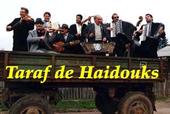Taraf de Haïdouks introduce us to a musical world which includes medieval ballads, turkish-flavoured dance tunes from the Balkans, and characteristic vocal inflections which remind us of the Gypsy people's origin in the Indian sub-continent.Taraf de Haïdouks, whose name translates as "band of brigands," are a village band Of Gypsy lautari (traditional musicians) from the small Romanian Village Of Clejani, southwest of the capital city of Bucharest. A dozen instrumentalists and singers ranging in age from 20 to 78, the group had never performed outside of their region before being discovered by Stepháne Karo and Michel Winter, two young Belgian music fans who fell in love with their music during a trip to Romania in 1990.Shortly after their visit, Karo & Winter organized a few concerts for the group in Belgium. The group then released their first recording at the end of 1991 entitled Musique des Tsiganes de Roumanie. The recording introduced Western listeners to the rich musical world of the Romanian Gypsies, which includes medieval ballads, Turkish-flavored dance tunes from the Balkans, and characteristic vocal inflections reminiscent of the Gypsy people's origins in the Indian sub-continent.The album was hailed by the media and immediately topped the European World Music Chart. It also inaugurated a touring schedule that has continued for the last eight years, including a first round of US dates one year ago. Taraf became the first real village band to tour widely and take western Europe by storm, equally at home on the concert stage or at all-night busking sessions at local bars or on the streets.In 1992 Taraf de Haïdouks played a prominent part in the French/Gypsy director Tony Gatlif's acclaimed film Latcho Drom, which won awards at the Cannes Festival. The second album by Taraf de Haïdouks, entitled Honourable Brigands, Magic Horses and Evil Eye, was recorded in Romania in 1994. Voted Best World Music Album in 1995 by the German Critics Association, it inspired the French director Guy Dernoy to produce a documentary on the band for the French- German TV channel ARTE.Tarafs most recent recording, Dumbala Dumba, was recorded in Clejani and Bucharest at the end of 1997 and produced by Karo, Winter and Crammed Discs producer Vincent Kenis.Between recordings and tours throughout the Western world, the members of the Taraf return to their village of Clejani and their traditional lifestyle. They live by and for their music, which punctuates all the important events of the village's social life: christenings, weddings, burials, harvests, etc. The invigorating music of Taraf de Haïdouks is a mix of local styles and flavors representing the richness of the Romanian folk tradition ranging from haunting heartland ballads to dizzying fiddle dances. Performing on violin, accordion, cymbalum, upright bass and vocals, the older members contribute soul and experience, the younger ones speed and energy.------calabashmusic.com
